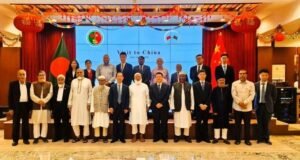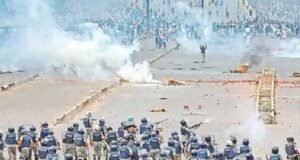
For the first time in over twelve years, Bangladesh and Pakistan are set to engage in a formal political dialogue later this April, according to a report published Saturday (April 5) by Daily Pakistan.
The last such dialogue between the two nations took place in 2012. This upcoming round of discussions is expected to focus on charting out a framework for future bilateral cooperation.
The renewed initiative comes amid growing signs of rapprochement between Dhaka and Islamabad, with both countries expressing interest in improving ties. The primary objective of the dialogue is to institutionalize bilateral relations and explore avenues for enhanced political, economic, and social coordination.
Pakistan’s Foreign Secretary Amna Baloch is slated to lead the Pakistani delegation. While Bangladesh’s representative has not yet been officially named, diplomatic sources suggest senior-level participation is expected.
Key issues on the agenda include strengthening diplomatic ties, reactivating the Joint Ministerial Commission, and establishing a formal platform to boost coordination on various bilateral and regional matters.
In a significant development ahead of the dialogue, Pakistan’s Deputy Prime Minister Ishaq Dar is scheduled to visit Bangladesh from April 22 to 24. Islamabad views the visit as a critical opportunity to deepen economic and diplomatic ties and expand cooperation in trade, security, and strategic affairs.
This renewed engagement comes in the wake of major political shifts in Bangladesh. Following the popular uprising on August 5 last year that led to the ousting of former Prime Minister Sheikh Hasina, the interim government has steered the country’s foreign policy in a new direction. The current administration has prioritized strengthening ties with regional powers, notably Pakistan and China, focusing on defense cooperation and trade.
Analysts believe the upcoming dialogue could pave the way for a more robust and stable relationship between Bangladesh and Pakistan, with potential implications for regional cooperation and geopolitical balance in South Asia.
 Weekly Bangla Mirror | Bangla Mirror, Bangladeshi news in UK, bangla mirror news
Weekly Bangla Mirror | Bangla Mirror, Bangladeshi news in UK, bangla mirror news







